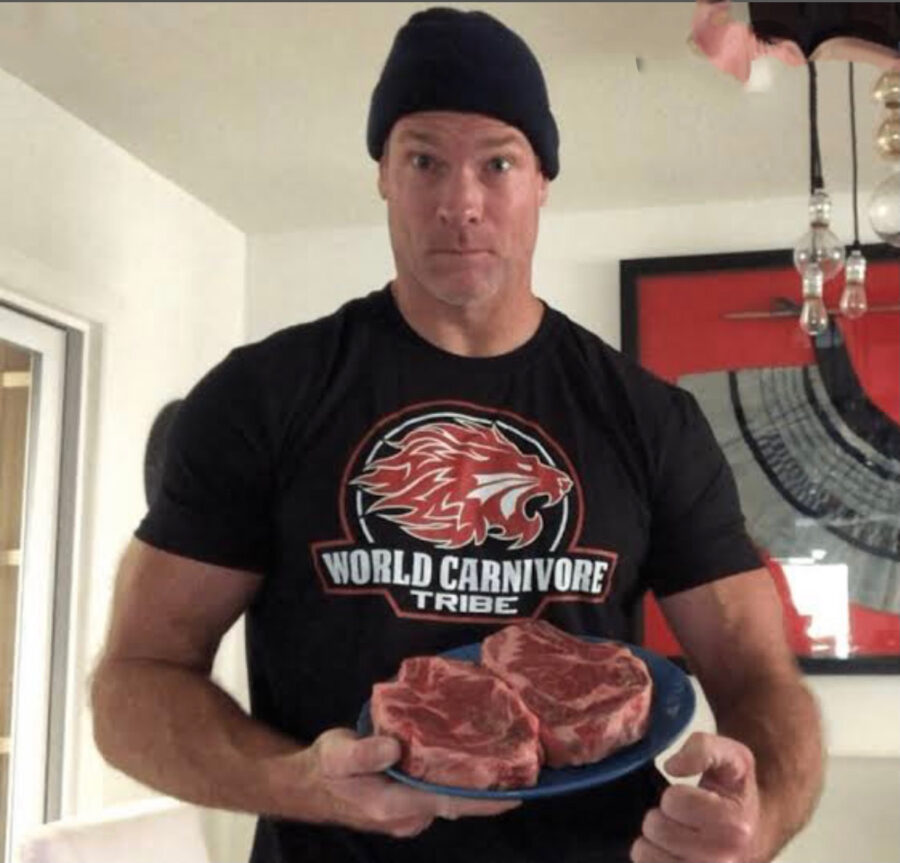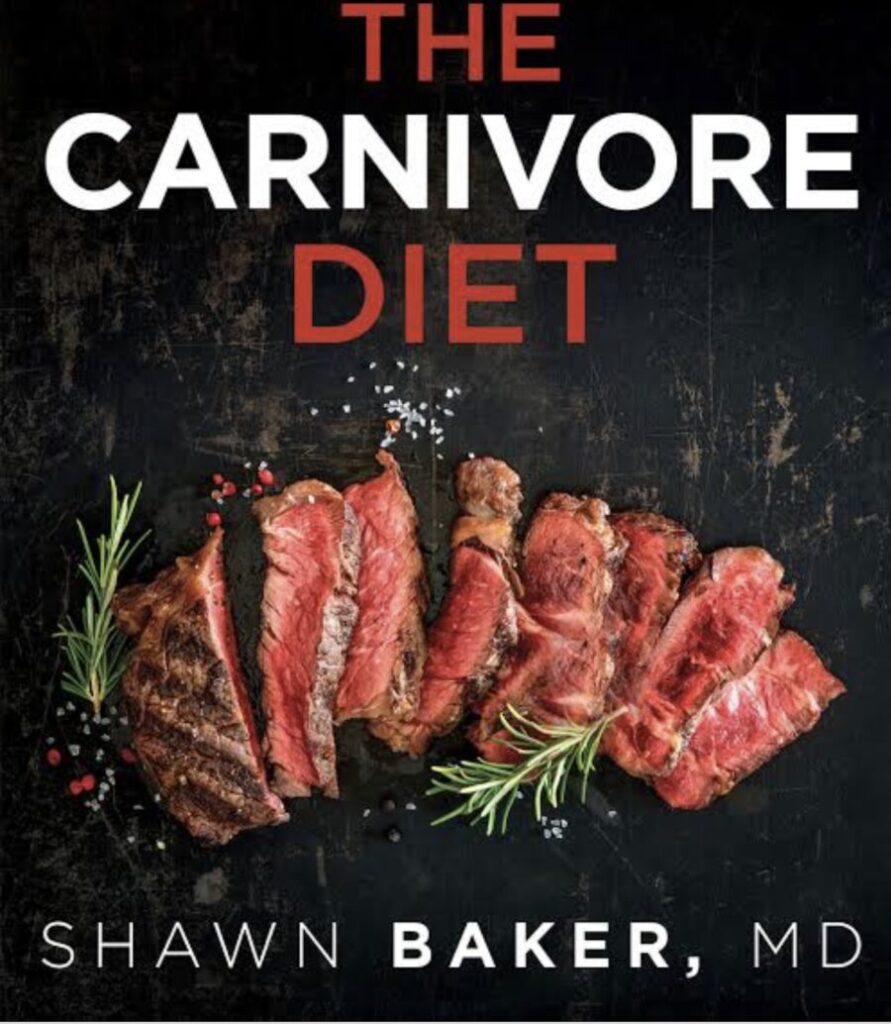It’s not often you find a very fit and healthy 6-foot 5 multisport elite level athlete in his 50’s who only consumes meat. 2kg a day to be precise. Did I forget to mention that he’s also an Orthopaedic surgeon and a US Veteran?
Meet Dr Shawn Baker!
He is considered by many to be the ‘founding father of the Carnivore Diet, and unlike most MD’s, Dr Baker has actively been pursuing a unique method of trialling strict elimination diets to help patients fight chronic disease, with much success!

Dr Shawn Baker, age 56, consumers 2 kilograms of meat per day
Dr Baker is also the author of the bestselling book “The Carnivore Diet” and CEO of MeatRx. MeatRx is an online Health coaching and support platform where patients are assisted by regaining their health through a meat-based diet. It also provides access to support groups, coaching and recipes. Dr Baker and his colleagues have personally witnessed hundreds of people cure or reverse chronic joint pain, mental health issues, diabetes, autoimmune issues, skin health, gut health and gut issues, obesity, and more with a strict Carnivore elimination diet.


The Carnivore Diet has come under the spotlight recently with what seems like the most prominent and dramatic story of a total cure from years of suffering by Canadian Mikhaila Peterson (daughter of psychology professor, clinical psychologist and author Jordan Peterson). Mikhaila had juvenile rheumatoid arthritis that was so severe she’d had three joint replacements (a hip and two ankles) before age 17.
She also had extreme fatigue, anxiety and depression. In 2015 she began eliminating foods to see if a specific food was contributing to her autoimmune issues. She ended up eating just beef, salt and water — and all her symptoms disappeared.


Mikhaila Peterson believes her symptoms of rheumatoid arthritis, fatigue, anxiety and depression have disappeared by following the Carnivore Diet
So, what is the Carnivore Diet? The Carnivore Diet is a restrictive diet that only allows the consumption of meat, fish, and other animal foods like eggs and certain dairy products.
It excludes all other foods, including fruits, vegetables, legumes, grains, nuts, and seeds. However, there are different ‘levels’ to the carnivore diet which ranges in restrictiveness.
Its advocates also recommend eliminating or limiting dairy intake to foods that are low in lactose — a sugar found in milk and dairy products — such as butter and hard cheeses.
The Carnivore Diet stems from the somewhat controversial belief that human ancestral populations (For example Cavemen and the Inuit) ate mostly meat and fish and that high-carb diets are to blame for today’s high rates of chronic disease.
Other popular low-carb diets, like the keto and paleo diets, limit but don’t exclude carb intake. However, the Carnivore Diet aims for zero carbs.
Where did the Carnivore Diet originate from and how did it grow to be so popular?
The diet can be traced to the German writer, Bernard Moncriff, author of The Philosophy of the Stomach: Or, An Exclusively Animal Diet, in 1856. In the 21st century, fad dieters reported following extreme variations of the diet where only red meat, salt and water were consumed.
This is the strictest form of the Carnivore Diet, the likes of which esteemed psychologist and author Jordan Peterson have sworn by curing them of a debilitating disease.
Some examples of ethnic minority groups who survive (and thrive) off just meat:
- The Inuit of the Canadian Arctic thrived on fish, seal, walrus and whale meat.
- The Chukotka of the Russian Arctic lived on caribou meat, marine animals and fish.
- The Masai, Samburu, and Rendille warriors of East Africa survived on diets consisting primarily of milk and meat.
- The steppe nomads of Mongolia ate mostly meat and dairy products.
- The Sioux of South Dakota enjoyed a diet of buffalo meat.
- The Brazilian Gauchos nourished themselves with beef.
These unique groups of people were the subjects of many serious medical investigations several decades ago, and there have been numerous scientific articles written about their diet and health.
Is there any research on Carnivorous Diets?
Although scarce, research regarding plant-free diets is available for everyone to see. Amber O’Hearn, for example, published a paper stating that the diet can meet all micronutrient needs, including Vitamin C.
Of particular interest, was a case series published in December of 2020 that reported five out of six subjects starting a carnivore diet resolved their small intestine bacterial overgrowth (SIBO).
Another article on the effects of a Palaeolithic Ketogenic Diet (PKD) on serum magnesium levels showed normal levels in all but one person, and reports of leg cramping resolving on PKD (which can be triggered by magnesium deficiency).
Ultimately, though yet unpublished, researchers from Harvard University, Dr Belinda Lennerz and Dr David Ludwig, have begun work on “the largest modern-day ‘carnivore’ study to date”. Although it is not considered a randomised control trial, the online survey-based study aims to collect health information, including blood tests, from individuals following a carnivorous diet for at least six months. (Dr Baker speaks about this in the interview below). This study will continue throughout 2021.
GCT’s Lifestyle Journalist Despina Karp sat down virtually with Dr Shawn Baker to discuss all things Carnivore Diet.
Dr Baker takes Despina through topics like:
- What exactly is the Carnivore Diet?
- Why the Carnivore Diet cops a lot of flak, especially amongst vegans
- Why it won’t cause colon cancer or heart disease,
- How meat can cure chronic illnesses.
- Who the Carnivore Diet works best for?
- How the Carnivore Diet doesn’t cause constipation, and if it does, you’re doing the diet wrong.
- Why constant bloating isn’t normal, and why influencers ‘normalising bloating’ is dangerous.
- How much meat do you need?
- Does Metformin ruin your gut?
- How he stumbled upon the Carnivore Lifestyle
- Why he’s never felt better than now, in his 50’s
- Why cutting out ALL PROCESSED foods is necessary, even if you can’t stick to a Carnivore Diet
- How long to do the Carnivore Diet for before expecting results.
- Why IBS is so prevalent in today’s society
- Does the Carnivore Diet work for every culture?
- Is eating meat bad for the environment?
It may sound crazy and controversial, but there are numerous studies and hundreds of testimonies from people who swear their lives have been changed by a Carnivore elimination diet.
Dr Baker recommends that if you suffer from any kind of chronic problem, “at the very least, cut out all sugar, processed grains and vegetable oils if you want to heal your body”, then if that’s not working, “try a paleo or KETO diet”. If that’s still not working, then you should consider a Carnivore Diet.
Read more about Dr Shawn Baker here and learn more about the Carnivore Diet here and here.
Akis Petretzikis’ Traditional Greek Lamb Kleftiko recipe
SOURCE: greekcitytimes











